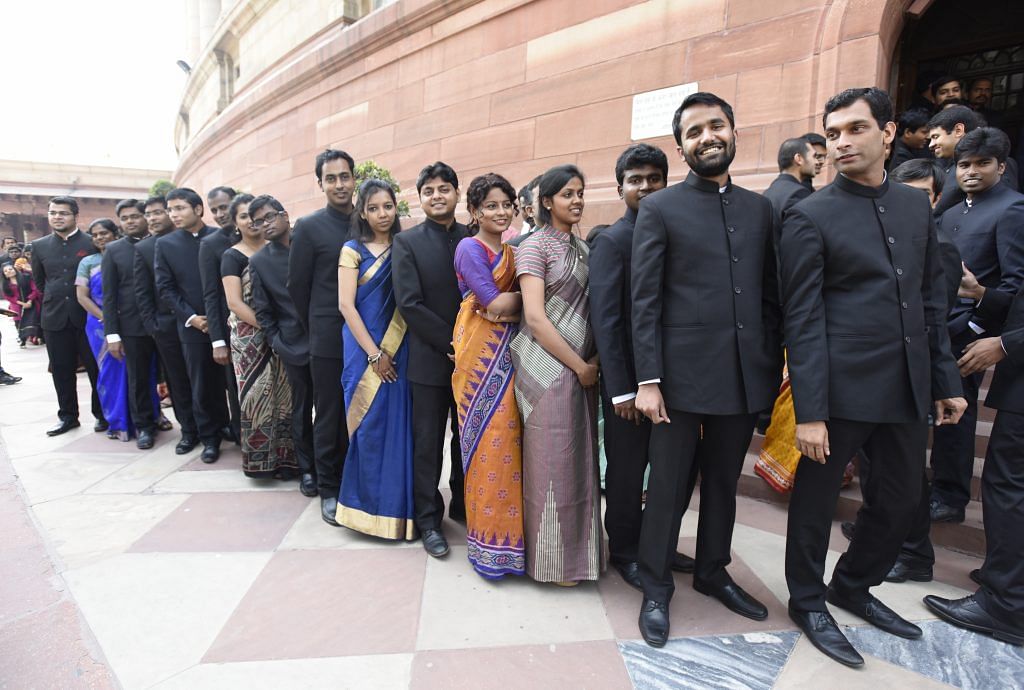Amid calls to induct ‘experts’ into the civil service, DoPT data shows an overwhelming majority of IAS picks have no specialisation of any kind.
New Delhi: Earlier this month, the NITI Aayog suggested that civil servants should be allocated positions and services in the government on the basis of their talent and domain expertise.
That could turn out to be a huge challenge if official data is anything to go by, as it turns out that a majority of the recruits to the Indian Administrative Service (IAS) — the dominant civil service in the country — is engineers or graduates.
Data with the Department of Personnel and Training (DoPT), for the years 2014 to 2016, shows that only a fraction of recruits have specialisation of any kind. The data for 2017 and 2018, although available, has not been fully organised by the government.
Consider this: In 2016, of the 176 IAS officers recruited, 56 had a degree in engineering, 73 were graduates in different branches of science, humanities and commerce, and only 25 had any degree beyond graduation.
Of these 25 too, many had studied engineering and followed it up with an MBA degree. Just a handful of recruited IAS officers had specialised degrees such as medicine (20), in law (1) and chartered accountancy (1).
The situation improved in 2015 but even here engineers dominated the list.
Of the 179 IAS recruits in 2015, 73 had degrees in engineering, 40 were graduates in other subjects, and 51 had a degree after graduation. The rest had degrees in medicine, law and dental sciences, among others.
In 2014, 69 of the recruits had degrees in engineering, 34 were graduates in different subjects, and only 39 of the 175 selected to the IAS had degrees after graduation.
“Across batches, if you see, most people study engineering before coming into the service, but that doesn’t mean they should only be given service based on what they have studied,” said a 2016 batch IAS officer on condition of anonymity. “That would kill the nature of civil services in India.
“Very few people even have a Master’s degree in any subject, so there is no ‘domain expertise’ as such — it is something we acquire on the job,” the officer added.
Also read: NITI Aayog recommendation is spot on, average age of IAS entrants is 27
A trend across the civil services
The trend is not limited to the IAS alone. Nearly half of those who crack the Union Public Service Commission (UPSC) civil services examination are engineering graduates, the government had said in a written reply in the Rajya Sabha last year. In fact, of the 20 UPSC toppers in 2017, 19 were engineers, it had said.
Moreover, most engineering graduates and doctors chose subjects such as public administration and sociology for their civil services exam, as opposed to subjects from their own fields, the government said. For example, not even 10 per cent of the doctors picked medical science as an option.
“There is always a difference between what one has studied and what one is interested in or good at,” said Parveen Kaswan, an Indian Forest Service officer from the 2016 batch. “In my batch, for example, I can say at least 40-50 per cent of the officers were from the IITs.”
Kaswan lists two reasons for this engineering dominance in the services.
“One, the general output of engineers is very high, and so there are more engineers in every field; and two, those coming from IITs have very high exposure and confidence levels, so they make it in the mains and interviews,” he said.
Call for ‘domain experts’
In its ‘Strategy for New India @75’ document released last week, the NITI Aayog has recommended bringing in “domain experts” into India’s otherwise generalist bureaucracy by suggesting that recruits into the civil services be placed in a “central talent pool”, after which candidates can be allocated positions in the government based on their qualification and expertise.
The recommendation is the latest attempt to shed the civil service, especially the dominant IAS, of what some call its anachronistic opposition to domain expertise.
While a NITI Aayog official had told ThePrint that the recommendation is “just an idea”, which would be sharpened if accepted by the government, the analysis of the educational qualification of IAS recruits shows that looking for domain expertise among the selected candidates may be an exercise in vain, some former civil servants said.
Also read: NITI Aayog says cap IAS entry age at 27: Keeping services youthful or limiting talent pool?
